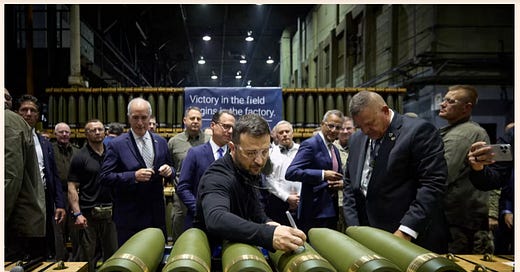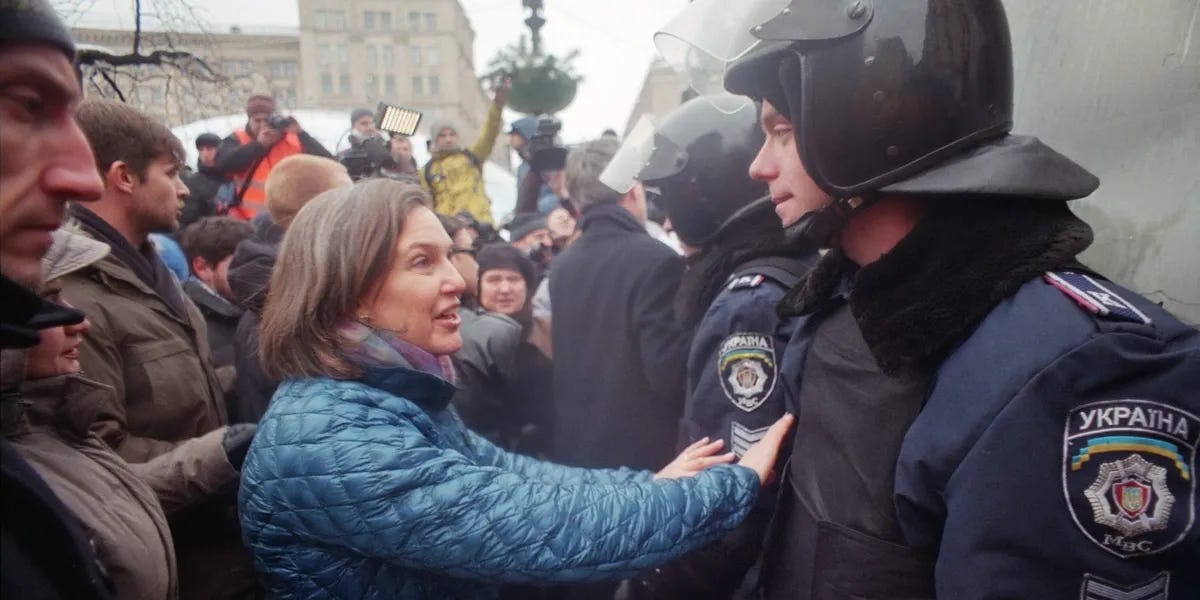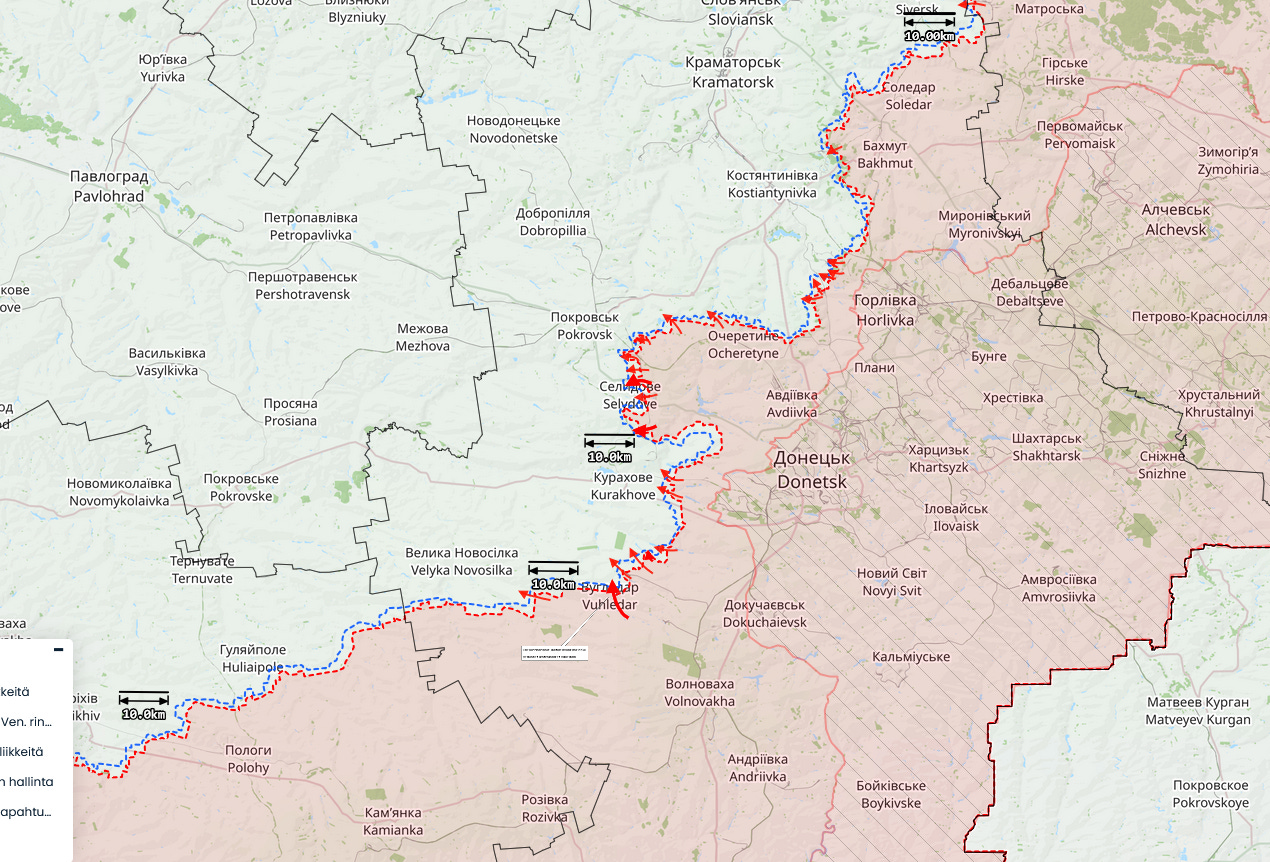Towards the Endgame?
An eye-opening report from the Financial Times on the War in Ukraine
The news coming out of Ukraine lately has not been very good for Kiev, nor for its western backers.
In fact, the news has been very bad and is only getting worse. Russia continues to grind out victory after victory in the Donbass, with the time between each victory becoming shorter and shorter. The Ukrainian invasion of Russia and the occupation of a salient on the border in the direction of the city of Kursk failed to lure Russia into moving some of its forces away from the Donbass and towards that section of the front. The Ukrainians are now stuck on Russian soil, with no larger strategy to direct them as to what to do next besides “hold”. Even worse, they re-directed precious resources for their gambit, resources that would have better served them in defending places like Pokrovsk, and like Ugledar, the fortress town that has served as a lynchpin in their defense in the Donbass, until it fell into Russian hands yesterday after holding out against them for two years.
President Zelensky has just returned from an important trip to the USA, with reports informing us that he has come away empty-handed. An $8 Billion USD cheque was cut to support Ukraine’s continued defense, but that is nowhere near what he requested as part of his so-called “Victory Plan”. The Americans also rejected the other key element of that plan, denying Ukraine the right to use US arms to hit targets deep within Russia.
What this should indicate to us is that the Americans have pretty much reached the end of the “escalation road”, and cannot see any clear path to continue it without inviting serious repurcussions from the Russian side. Back in March, I wrote about how Vicki Nuland’s “retirement” signaled the first, key step towards ending the conflict, as she led the “maximalist” wing of US policy towards Russia:
The maximalist wing sought regime change in Moscow as its ultimate goal, but the failure of Prigozhin’s rebellion and the disaster that was the Ukrainian Summer Counteroffensive made it plain to everyone that Russia was much stronger than the maximalists claimed it to be.
This signaled a change in approach to the war by Ukraine’s US-led western backers, but it did not mean that a peace deal would come about anytime soon. With the passing of the torch from the maximalists within the State Department (and presumably within the CIA) to the Department of Defense (DoD), continued escalation with a revised goal of a brokered settlement to end the war at some point in the future became the accepted strategy.
This new strategy saw strikes against Russian military and economic targets deep into Russia, with the aim of styming their ability to continue to attack Ukrainian forces, or at least slow them down. The fighting on the front continued to be a war of attrition. Unfortunately for the Ukrainians, it now appears that the escalation ladder has run out, and that its backers want to force it to the negotiating table. The problem with this is twofold:
Ukraine does not want to give up any of its territory, something that it must be prepared to concede in order to strike any deal with Russia
Russia is in no mood to negotiate as it sees itself winning on the ground1
The problem for the Ukrainians is that they are at the mercy of their western backers for financing their war effort, and their government' as well. They are now close to a breaking point as their backers do not see them as being able to turn the tide on the battlefield, with the added risk of military collapse as well.
Everyone is waiting for the other shoe to drop, that shoe being an official recognition by Ukraine that it cannot win the war, or a Russian breakthough on the battlefield. Many have been predicting this to happen for some time now, but neither of these two things have yet come to pass. We have seen signals emanating from western media that Ukraine’s backers do recognize the reality of this being an unwinnable war, but it has yet to be translated into direct talks with Russia to end it. The Ukrainians somehow keep fighting on despite the continuous, persistent Russian onslaught.
Yesterday, The Financial Times published a report on the state of the war in Ukraine, and it is, in my opinion, very, very good and confirms quite a lot of what we all have been saying and thinking for some time (inb4 “confirmation bias” accusations). It is so good that I have decided to share some excerpts from it with you rather than write up a long essay saying the exact same things.
On the UAF side of the front line in Donbass:
“Right now, I’m thinking more about how to save my people,” says Mykhailo Temper. “It’s quite hard to imagine we will be able to move the enemy back to the borders of 1991,” he adds, referring to his country’s aim of restoring its full territorial integrity.
Once buoyed by hopes of liberating their lands, even soldiers at the front now voice a desire for negotiations with Russia to end the war. Yuriy, another commander on the eastern front who gave only his first name, says he fears the prospect of a “forever war”.
“I am for negotiations now,” he adds, expressing his concern that his son — also a soldier — could spend much of his life fighting and that his grandson might one day inherit an endless conflict.
“If the US turns off the spigot, we’re finished,” says another officer, a member of the 72nd Mechanised Brigade, in nearby Kurakhove.
Remember: this is from FT, a media outlet firmly on the side of Ukraine.
War fatigue on the Ukrainian side is growing:
It is struggling to restore its depleted ranks with motivated and well-trained soldiers while an arbitrary military mobilisation system is causing real social tension. It is also facing a bleak winter of severe power and potentially heating outages.
“Society is exhausted,” says Oleksandr Merezhko, chair of the foreign affairs committee of the Ukrainian parliament.
At the same time, Ukrainian President Volodymyr Zelenskyy is under growing pressure from western partners to find a path towards a negotiated settlement, even if there is scepticism about Russia’s willingness to enter talks any time soon and concern that Ukraine’s position is too weak to secure a fair deal right now.
“Most players want de-escalation here,” says a senior Ukrainian official in Kyiv.
Mobilization has become a serious problem, and a catch-22 as well as the youngest adult males have not been mobilized because they are needed to work in the factories and elsewhere, but the UAF is running short on infantry to man the front.
A key concession:
The Biden administration is aware that its present strategy is not sustainable because “we are losing the war”, says Jeremy Shapiro, head of the Washington office of the European Council on Foreign Relations. “They are thinking of how to move that war to a greater quiescence.”
They need to get Ukraine to the negotiating table, and they need Russia to be there as well.
Zelensky returning empty-handed from the USA:
Yet the Ukrainian leader left Washington empty-handed on two central issues: US permission to use western weapons for long-range strikes on Russian territory; and progress on Ukraine’s bid to join Nato. The Biden administration has resisted both, fearing it could encourage Moscow to escalate the conflict, potentially drawing in the US and other allies.
US officials were unimpressed by Zelenskyy’s “victory plan”, which includes requests for massive amounts of western weaponry.
An adviser who helped prepare the document says Zelenskyy had no choice but to restate his insistence on Nato membership because anything else would have been perceived as a retreat on the question of western security guarantees, which Ukrainians see as indispensable.
Despite Washington’s misgivings, the ability to strike Russian territory is also central to Zelenskyy’s victory plan, says the adviser. While US officials have argued that Russia has already moved strike aircraft beyond the range of western missiles, Ukrainian officials insist there are plenty of other targets such as command centres, weapons caches, fuel depots and logistics nodes.Destroying them could disrupt Moscow’s ability to wage war, show Russian leader Vladimir Putin that his objectives of seizing at least four whole provinces of Ukraine are untenable and disprove his conviction that the west will lose interest in supporting Ukraine.
In effect, a “Hail Mary” call that was rejected.
On the diplomatic front:
Multiple European diplomats who attended last week’s UN General Assembly in New York say there was a tangible shift in the tone and content of discussions around a potential settlement.
They note more openness from Ukrainian officials to discuss the potential for agreeing a ceasefire even while Russian troops remain on their territory, and more frank discussions among western officials about the urgency for a deal.
Ukraine’s new foreign minister, Andrii Sybiha, used private meetings with western counterparts on his first trip to the US in the post to discuss potential compromise solutions, the diplomats said, and struck a more pragmatic tone on the possibility of land-for-security negotiations than his predecessor.
“We’re talking more and more openly about how this ends and what Ukraine would have to give up in order to get a permanent peace deal,” says one of the diplomats, who was present in New York. “And that’s a major change from even six months ago, when this kind of talk was taboo.”
The Ukrainian foreign ministry said: “No territorial compromises were suggested, discussed, or even hinted at during any of the meetings.”
Land-for-security. The first problem is how to convince Kiev. The second one is how to sell it to the Ukrainians who have sacrificed so much in this war already. Additionally, they face a brutal winter as so much of their energy grid has been knocked offline by Russian strikes:
“If you get into any negotiation, it could be a trigger for social instability,” says a Ukrainian official. “Zelenskyy knows this very well.”
“There will always be a radical segment of Ukrainian society that will call any negotiation capitulation. The far right in Ukraine is growing. The right wing is a danger to democracy,” says Merezhko, who is an MP for Zelenskyy’s Servant of the People party.
Note the bolded portion: this is an excellent indication of how Ukraine intends to deal with the radical rightist element after the war is brought to a close. These rightists have been serving as cannon fodder on the front (recall Azov in Mariupol, for example) the entire time, to be disposed of afterwards….at least those who survive the meatgrinder. It remains a mystery to many how these right wingers can’t see this themselves. Some people insist on learning lessons the hard way.
The NATO Problem
The Ukrainians want security guarantees, and for obvious reasons. Yet the guarantees that they seek are the main reason that this conflict broke out in the first place:
“The most important thing for us is security guarantees. Proper ones. Otherwise it won’t end the war; it will just trigger another one,” says a Ukrainian official.
“Land for [Nato] membership is the only game in town, everyone knows it,” says one senior western official. “Nobody will say it out loud . . . but it’s the only strategy on the table.”
Nato membership remains Ukraine’s key goal, but very few of the alliance’s 32 members think it is possible without a full, lasting ceasefire and a defined line on the map that determines what portion of Ukraine’s territory the alliance’s mutual defence clause applies to. The model floated by some is West Germany’s membership of the alliance, which lasted more than three decades before the fall of the Berlin Wall and reunification with the east.
“The West German model is gaining traction particularly in the White House, which has been the most sceptical about Nato membership,” says Shapiro of the ECFR. “The Russians would hate that, but at least it could be some opening gambit for a compromise.”
But even that would require a vast force deployment by the US and its partners that any US administration, Democratic or Republican, would probably balk at, given Washington’s focus on the threat from China. One question would be whether European powers would be willing to shoulder more of the burden.
It’s no secret that the Americans want to shift the burden of the war in Ukraine onto the Europeans, as they want to focus on China and East Asia.
And still:
And would Russia accept Ukraine’s entry into the alliance, an alignment with the west it has been trying to thwart militarily for a decade? Many on both sides of the Atlantic say it is unlikely.
“I don’t think Russia would agree to our participation in Nato,” says a senior Ukrainian official.
Anything short of full membership is unlikely to be enough to stop the Kremlin’s military aggression. “Even if we get a Nato invitation, it will mean nothing. It’s a political decision,” adds the senior Ukrainian official.
An important recognition:
“It’s about constraining Russia’s capabilities” and piling on pressure to get them to open talks, says the senior Ukrainian official. “It’s a real chance if we are thinking about resolving this war.”
Not only do the Americans need to convince the Ukrainians to go the negotiating table, they need to convince the Russians as well. Russia’s economy is performing above expectations at present, but they are hitting the limits of what they can achieve during wartime. There is a strong business lobby that has Putin’s ear, so it is not unreasonable to expect the Russians to agree to negotiations even as they continue to ever so slowly grind the Ukrainians into dust in Donbass. The Russians have spent quite a lot of treasure and spilled quite a lot of blood in pursuit of their strategic goals. How much more can they endure before they are ready to deal?
As I’ve mentioned in previous essays, there is always the possibility that the Russians will snatch defeat (or a lesser win) out of the jaws of victory via back channel diplomacy that sets the parameters for a negotiated settlement to the conflict







A good piece, yet again very balanced. FbF practically alone in commenting on Russia without hysteria or wishful thinking.
NATO's problem is that security guarantees are meaningless because the US lacks both capacity and good faith.
The US cannot defend Ukraine's borders. It can barely support Ukraine's defence of its own borders. Moreover, the US lacks the will to go to war for Ukraine. The Biden Administration is already operating at the extreme limits of what it can achieve politically. Any promise now would be a sick joke.
Furthermore, the US is simply incapable of negotiating with Moscow. It lacks the political capital or the diplomatic resources. The most senior US officials make fools of themselves in Moscow. Their personal conduct towards their Russian peers has been ludicrous, overbearing and provocative. This has been the case under successive presidents. It makes communication difficult, trust impossible.
Finally, we all know that the US lacks good faith towards all parties, including its allies, without exception. Before he died a senior Hizbolllah figure recently admitted to the BBC Arabic service that the Obama Administration had leaked advance knowledge of Israeli military operations to Lebanon. This was confirmed by Lebanese officials.
This speaks for itself. The Ukrainians cannot trust their masters in Washington anymore than Moscow could. The US is not just incapable of functioning diplomatically, it cannot function as an ally.
TurboAmerica has made gains from the war, especially in gouging Europe on energy and weapons and further deindustrialiasing a once formidable rival.
For now the task for the US is to take whatever measures can be taken to reduce the exposure of the US to counter-party risk from Ukrainian securities, prepare another Operation Paperclip for the US fifth column and identify appropriate talent in the ranks of the US diplomatic corps to succeed the current generation. There is not much point in doing anything else.
The rest of the sane world knows that Russia did not want this war. The US neocons and their low IQ sycophants led the Ukrainians to believe they could defeat Russia. Instead, Russia has defeated the Ukrainians, NATO, and the Americans. This will reverberate around the world. Think Russo-Japanese conflict of 1905 and its repercussions.